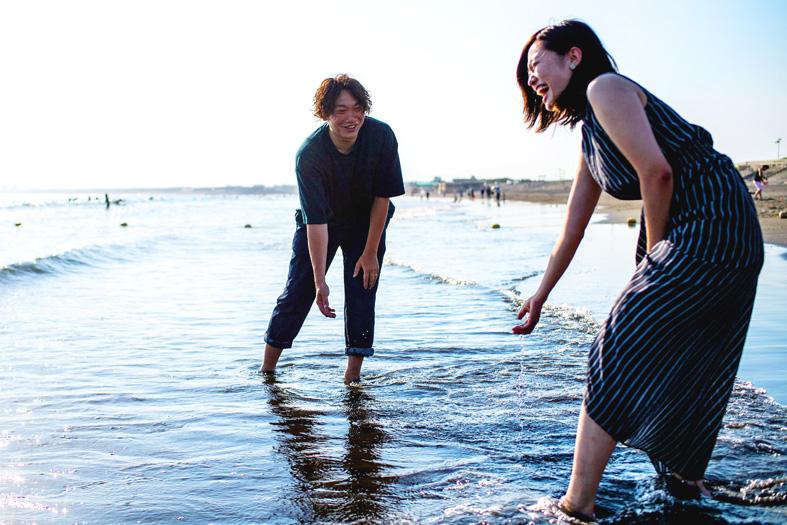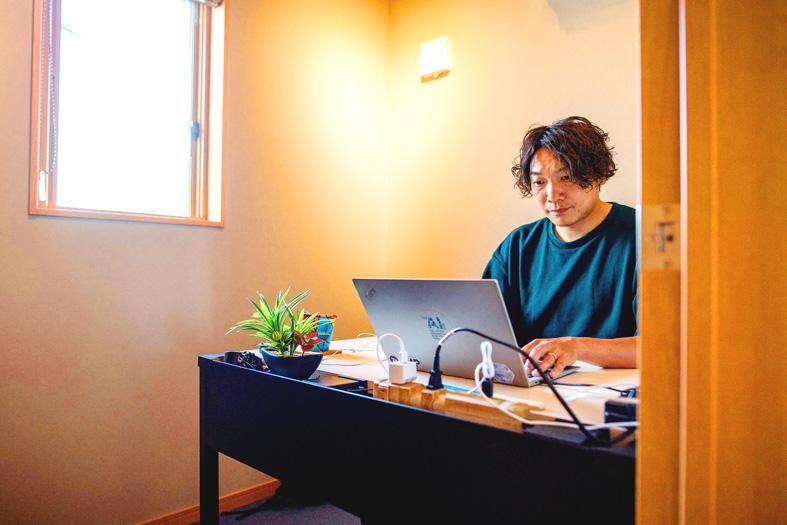Posted far from home for his job at Japanese conglomerate Hitachi Ltd, father of two Tsutomu Kojima was “really lonely” until he began working remotely during the COVID-19 pandemic for the first time.
COVID-19 has upended office routines worldwide, but in Japan — where punishing hours and reliance on paper files, ink stamps and fax machines has long been the norm — some say the shake-up was sorely needed.
Before the pandemic, just 9 percent of the Japanese workforce had ever teleworked, compared with 32 percent in the US and 22 percent in Germany, Tokyo-based consultancy firm Nomura Research Institute Ltd said.

Photo: AFP
However, a quiet revolution in the country’s rigid business culture is under way, with firms working to digitize operations and offer more flexibility to staff who were once expected to stay late, go drinking with their boss and accept far-flung transfers.
Kojima used to live alone in accommodation provided by Hitachi near Tokyo, an hour and a half by bullet train from his family in Nagoya.
Back then, he would return only twice a month, but now the 44-year-old works exclusively from home, saying he is more productive and closer to his teenage daughters.

Photo: AFP
“I have more time to help them with their studies. My youngest told me she hopes things stay like this,” he said.
“I used to feel really lonely” in Tokyo, Kojima said, adding that he has since realized that “true balance means not giving up on family.”
OLD HABITS
Nearly one-third of jobs in Japan were done remotely during the first COVID-19 wave in the spring of 2020, the Japan Productivity Center said, even though the government never imposed strict stay-at-home orders.
The rate has since fallen to 20 percent, but that is still far higher than before the pandemic, quarterly surveys by the non-profit organization showed.
To encourage telework, the government and some companies made efforts to phase out personalized ink stamps used to certify documents, as well as the ubiquitous fax machine.
Often in Japan, “business has to be done in person, on paper,” habits dating back to the 1970s and 1980s, when the Japanese economy was booming, said Hiroshi Ono, a professor at Hitotsubashi University specializing in human resources.
“One of the things COVID has done is bring those barriers down: Work doesn’t have to be done at the office, men can work at home,” he said.
Companies are realizing that new ways of working can be more efficient, he added.
“Before COVID, it was so important for employees to show that they’re working hard, instead of actually producing results.”
‘NEW BALANCE’
Reflecting trends elsewhere, people are also fleeing the big city.
A record number of company headquarters moved out of Tokyo last year, Teikoku Databank found.
Its population has also dropped for the first time in 26 years.
Among those who have upped sticks are Kazuki and Shizuka Kimura, who left their cramped Tokyo apartment for a custom-built house near the sea.
The couple now mostly do their jobs in communication and marketing remotely from Fujisawa, southwest of the capital, having struggled to work from home in Tokyo.
“It was really COVID that made us take this decision,” said Kazuki Kimura, who used to seek out other places to do meetings — at his parents’ home or in cafes, remote-work boxes set up in train stations and even karaoke booths.
“Sometimes you could hear singing from the booth next door,” which made it difficult to concentrate, said the 33-year-old, who is now learning to surf.
Shizuka Kimura, 29, said she thinks “more and more people are now prioritizing their well-being, rather than their job,” but questioned how quickly things will change on a wider scale.
This is a concern shared by Hiromi Murata, global research center manager and senior chief researcher at Recruit Works Institute, who said smaller companies might be slower to adapt to new work styles than big firms such as Hitachi, Panasonic Holdings Corp or telecoms giant Nippon Telegraph and Telephone Corp.
Remote work can also pose a problem for training new recruits, because “you learn on the job,” Murata said. “Before, it was so important to meet in the office ... each business must find a new balance, in their own way and time.”

TAKING STOCK: A Taiwanese cookware firm in Vietnam urged customers to assess inventory or place orders early so shipments can reach the US while tariffs are paused Taiwanese businesses in Vietnam are exploring alternatives after the White House imposed a 46 percent import duty on Vietnamese goods, following US President Donald Trump’s announcement of “reciprocal” tariffs on the US’ trading partners. Lo Shih-liang (羅世良), chairman of Brico Industry Co (裕茂工業), a Taiwanese company that manufactures cast iron cookware and stove components in Vietnam, said that more than 40 percent of his business was tied to the US market, describing the constant US policy shifts as an emotional roller coaster. “I work during the day and stay up all night watching the news. I’ve been following US news until 3am

UNCERTAINTY: Innolux activated a stringent supply chain management mechanism, as it did during the COVID-19 pandemic, to ensure optimal inventory levels for customers Flat-panel display makers AUO Corp (友達) and Innolux Corp (群創) yesterday said that about 12 to 20 percent of their display business is at risk of potential US tariffs and that they would relocate production or shipment destinations to mitigate the levies’ effects. US tariffs would have a direct impact of US$200 million on AUO’s revenue, company chairman Paul Peng (彭雙浪) told reporters on the sidelines of the Touch Taiwan trade show in Taipei yesterday. That would make up about 12 percent of the company’s overall revenue. To cope with the tariff uncertainty, AUO plans to allocate its production to manufacturing facilities in

Six years ago, LVMH’s billionaire CEO Bernard Arnault and US President Donald Trump cut the blue ribbon on a factory in rural Texas that would make designer handbags for Louis Vuitton, one of the world’s best-known luxury brands. However, since the high-profile opening, the factory has faced a host of problems limiting production, 11 former Louis Vuitton employees said. The site has consistently ranked among the worst-performing for Louis Vuitton globally, “significantly” underperforming other facilities, said three former Louis Vuitton workers and a senior industry source, who cited internal rankings shared with staff. The plant’s problems — which have not

COLLABORATION: Given Taiwan’s key position in global supply chains, the US firm is discussing strategies with local partners and clients to deal with global uncertainties Advanced Micro Devices Inc (AMD) yesterday said it is meeting with local ecosystem partners, including Taiwan Semiconductor Manufacturing Co (TSMC, 台積電), to discuss strategies, including long-term manufacturing, to navigate uncertainties such as US tariffs, as Taiwan occupies an important position in global supply chains. AMD chief executive officer Lisa Su (蘇姿丰) told reporters that Taiwan is an important part of the chip designer’s ecosystem and she is discussing with partners and customers in Taiwan to forge strong collaborations on different areas during this critical period. AMD has just become the first artificial-intelligence (AI) server chip customer of TSMC to utilize its advanced